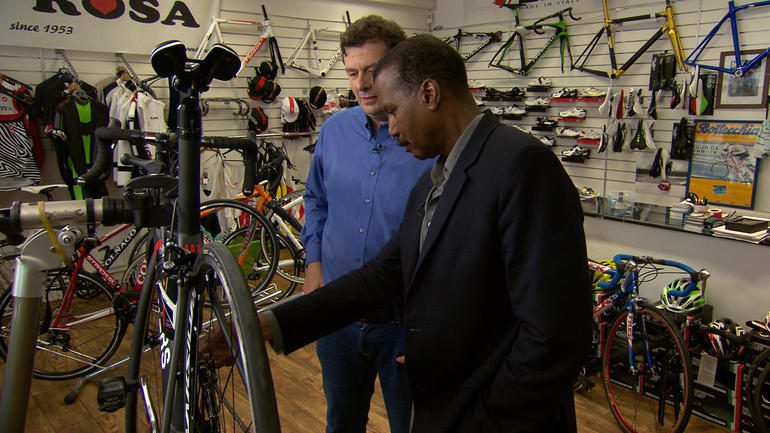UCI, Team Sky and Armstrong under increased scrutiny after 60 Minutes investigation into hidden motors
Hungarian engineer who's profited off of designing and selling hidden motors confident they have been used in pro races

After CBS News aired a 60 Minutes segment on Sunday, Jan, 29 that investigated the use of hidden motors in professional cycling, new questions have been raised about the conduct of the UCI at the 2015 Tour de France and Team Sky. Though no direct proof was presented, the segment made allegations of wrongdoing at the highest levels of the sport and on the biggest stages.
At the 2015 Tour de France, French authorities weighed bikes in the peloton before one of the races time trials. French authorities told the program that Team Sky was the only team with bikes heavier than the rest. Sky’s bikes they said all weighed about 800 g more than the other teams bikes.
Ahead of the 2015 Tour de France, Hungarian engineer Istvan ‘Stefano’ Varjas says he was instructed by an unknown buyer to drop motorized bikes off into locked storage in Beaulieu Sur Mer, France in between Nice and Monaco. Along with motors hidden in the frames, Varjas has designed motors for the hubs of bikes which weigh 800 g.
A Team Sky spokesperson says the increased weight could be due to the use of different equipment to increase the aerodynamic performance of the bikes. Unidentified sources allege that French investigators wanted to weigh the bikes wheels but the UCI did not allow them to.
The 2015 Tour de France had two time trials. The race started with an opening 13.8-km time trial in Utrecht, Netherlands and a 28-km team time trial on Stage 9 in which Team Sky finished second, one second back on winners team BMC.
Varjas may be profiting from the use of motors to cheat in professional cycling but continues to offer up information about alleged clients of his who bought his products and then may have used them to cheat. He says the motors have been available since 1998 and when asked if he believes they have been used by professional cyclists replied, “Yes, I know this. They are used, yes.”
RELATED: UCI official accused of warning others of police investigations into hidden motors
In 1998, Varjas received a $2 million payment from an anonymous buyer for exclusive use of his motor. Varjas says he couldn’t refuse such a good deal but affirms he has no idea who the rider was. He promised not to work on the motor, sell it or talk about it for 10 years. The program also reported that he spent time in jail for not paying a substantial tax bill in Hungary. In December, French newspaper Le Monde reported that this timeline implicates Lance Armstrong who won his first Tour de France in 1999. Armstrong and his lawyers denied these accusations when contacted.
The way the program investigated the hidden motor further implicated Armstrong. Varjas suggested the show buy a US Postal team bike, which they did, and in which he installed a hidden motor. They then got Armstrong’s former teammate Tyler Hamilton to test the bike. His conclusion, “I guess we should of known this was coming, you know? ‘Cause, I mean, there’s more pressure in today’s cycling world than ever to win.”
Jean-Pierre Verdy, the former testing director for the French Anti-Doping Agency, also corroborates the allegations that motors have been used in professional bike racing. He spoke out last year when French program Stade 2 investigated motors in cycling. When asked if motors have been used at the Tour de France he said, “Yes, of course. It’s been the last three to four years when I was told about the use of the motors. And in 2014, they told me there are motors. And they told me, there’s a problem. By 2015, everyone was complaining and I said, something’s got to be done.”
Only one rider has been caught using a motor in professional bike racing. Femke Van den Driessche became the first cyclist caught by the UCI for technological fraud using motor assistance at the 2016 UCI cyclocross world championships in Heusden-Zolder. Since, the UCI have developed more rigorous checks on bikes using a tablet.
While with Varjas, 60 Minutes says he received a telephone call from Michele Ferrari, the infamous banned doctor who helped Armstrong and other cyclists dope during their careers. The call was allegedly about arranging the pick up of motorized bikes which according to Varjas the Italian doctor has done for the past three years. Ferrari denies these accusations saying he has never bought one of his bikes but has tested one.
Tour de France winner Greg LeMond, who met Varjas at the Tour de France in 2014 and tried one of his bikes, also exspressed concern over the technology. “I don’t trust it until they figure out how to take the motor out. I won’t trust any victories of the Tour de France.”
